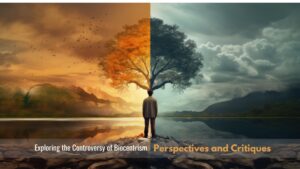Biocentrism, a philosophical theory proposing that consciousness is the fundamental reality of the universe, has sparked intense debates within scientific and philosophical circles. Introduced by Robert Lanza in 2007, this theory challenges traditional views on the universe, asserting that life and consciousness shape reality rather than being mere byproducts. In this exploration, we delve into the multifaceted perspectives surrounding biocentrism, considering its intriguing propositions, ethical implications, scientific scrutiny, and the counterarguments it faces.
Table of Contents
ToggleUnderstanding Biocentrism
Biocentrism, as outlined by Lanza, posits that life and consciousness are at the core of the universe, creating a paradigm shift that places biology, not physics, as the fundamental science. The concept suggests that the universe is a mental construct shaped by perception, and the interplay between the observer and the observed is central to this theory. This unique perspective raises questions about the nature of reality, challenging traditional scientific frameworks.
Ethical Implications and Value of Life
Biocentrism’s ethical implications are profound, challenging the anthropocentric view and asserting that all living organisms possess intrinsic moral value. This ethical stance prompts considerations for environmental conservation and our responsibilities toward other species. The theory advocates for a holistic approach, recognizing the interconnectedness of all living beings. However, critics argue that assigning equal moral value to all life forms may lead to ethical dilemmas, especially when conflicting interests arise among different species or ecosystems.
Scientific Scrutiny and Testing
The scientific community has scrutinized biocentrism, questioning its validity and compatibility with established scientific principles. While some aspects of biocentrism find support in quantum mechanics, critics highlight the lack of empirical evidence as a significant concern. The observer effect, derived from quantum mechanics, is central to biocentrism , suggesting that the mere act of observation can alter outcomes. However, differing interpretations of this concept fuel ongoing debates among scholars. The clash between biocentrism’s emphasis on consciousness shaping reality and the traditional belief in an objective, external world challenges the theory’s scientific standing.
Biocentrism Debunking
The debate on biocentrism debunking intensifies when critics raise challenges related to its departure from conventional scientific theories and the lack of empirical evidence. The article emphasizes that the theory faces difficulties in proving the validity of its claims through concrete scientific data. Alternative theories, such as theanthropocentrism and ecocentrism, are presented as contenders that weaken biocentrism’s unique position. Furthermore, the article delves into the ethical dilemmas biocentrism encounters in practical applications, adding to the skepticism about its scientific and ethical viability.
Mixed Reactions on Biocentrism
The controversy surrounding biocentrism is vividly illustrated by the mixed reactions it elicits within different communities. While the philosophical community finds the concept intriguing for ethical considerations, scientific critics, particularly physicists, question its scientific foundation. The article acknowledges ongoing debates and suggests that biocentrism may adapt and find a place in the academic conversation as our understanding of ecosystems and species evolves.
Conclusion
In conclusion, the controversy of biocentrism is a rich tapestry of perspectives, critiques, and ongoing debates. The theory challenges established scientific norms, emphasizing the role of consciousness in shaping our understanding of the universe. Ethical implications, scientific scrutiny, and counterarguments contribute to the complexity of the discourse. While some find biocentrism an intriguing lens for environmental ethics, others remain skeptical, emphasizing the need for empirical evidence and practical viability. The journey into the heart of the biocentrism controversy invites us to reflect on our relationship with the natural world and ponder the profound questions it raises about the nature of existence.





